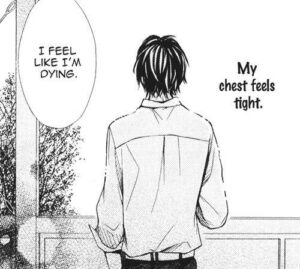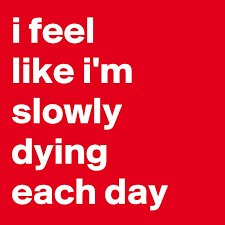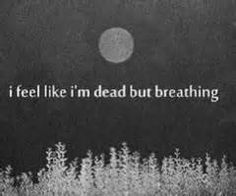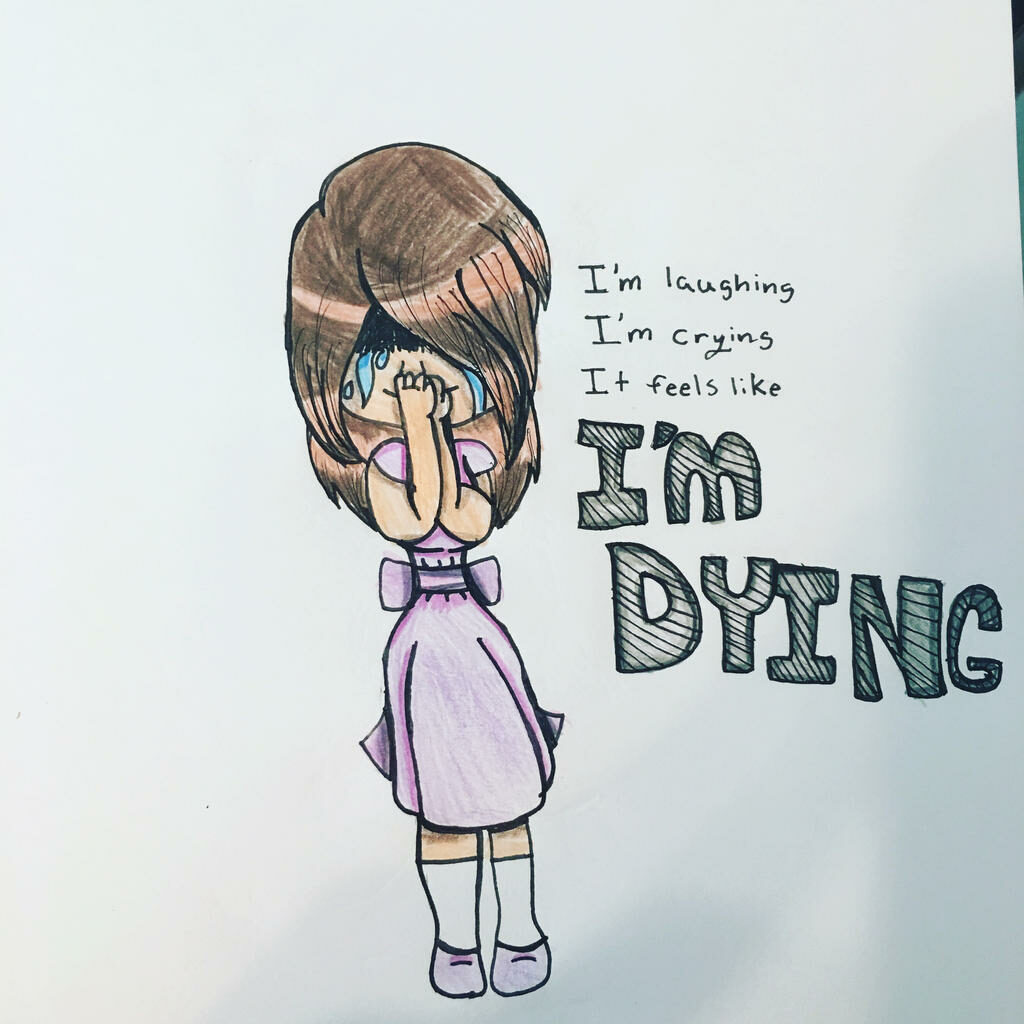It’s okay not to be okay. Many people feel like they’re dying (I feel like I’m dying) even though they’re not. This is a feeling that can be understood and dealt with to make the person feel better. In this blog post, we will explore what it feels like to die, the common symptoms and risk factors, as well as ways how to deal with the feeling.
Contents
Understanding The Feeling

The feeling of dying can be best described as a sense that one’s life is coming to an end. It can be accompanied by various symptoms such as feelings of emptiness, isolation, anxiety, and despair.
The Feeling of Dying
The feeling of dying varies from person to person depending on their age and other factors. Such as past experiences with death. Some people may feel like they’re losing control. And that things are happening beyond their understanding or control. Contrarily, others may feel a sense of peace and calmness.
Common Symptoms
The following are some common symptoms that may be associated with the feeling of dying:
Physical Symptoms
The feeling of dying can be accompanied by physical symptoms such as:
- Inability to focus: It may be difficult to concentrate on anything due to the overwhelming feeling of dying.
- Loss of appetite: You may not feel like eating anything due to a lack of interest or because you don’t have the energy.
- Insomnia: This is common among people who are struggling with death-related thoughts as they often keep you awake with worry and anxiety.
- Chest pain or tightness: Chest pains are a common symptom for people experiencing the sensation of death. This may include discomfort in your chest region, shortness of breath, and pressure sensation that makes you feel like you’re having trouble breathing. It could also be accompanied by dizziness, nausea, and a sense of unreality.
Emotional Symptoms
The feeling of dying can also be accompanied by emotional symptoms such as:
- Feelings of emptiness: It may feel like you’re on the verge of dying because there’s nothing left in life to give meaning.
- Anxiety: This includes feelings of dread, panic, and uneasiness. It may also be accompanied by excessive worrying about death or dying.
- Feelings of isolation: This can be caused by a lack of social support or when your relationships with others become strained due to stress and anxiety.
- Despair: The feeling of death can also be caused by hopelessness and despair about life. Especially if you’re facing challenges that seem insurmountable or overwhelming.
- Depression: Depression is a common symptom of the feeling that you’re dying. Because it can make you feel hopeless, helpless, and worthless. Some people report an increase in suicidal thoughts when they have this sensation too long-lasting periods without treatment for depression.
Reasons And Risk Factors

The feeling of dying can be caused by physical illnesses, emotional problems, or drug and alcohol abuse. It may also be a symptom of depression and other psychological disorders such as anxiety disorder.
Physical Illness: Some people experience this sensation when they have an illness that is causing them to feel weak or exhausted. It may be accompanied by other physical symptoms such as muscle weakness and fatigue.
Drug And Alcohol Abuse: When someone is abusing drugs or alcohol, it can increase their risk of experiencing the feeling of dying. This is because drug and alcohol abuse can cause psychological problems such as depression and anxiety disorder.
Depression: As mentioned earlier, depression often causes people to feel hopeless, helpless, and worthless. These feelings can lead them into thinking that life is not worth living anymore so they may start believing in death as an escape from their misery.
Anxiety Disorder: Anxiety disorder refers to a group of mental illnesses where people have excessive worry and fear about things happening around them such as social situations or performance. People with anxiety disorder often feel like they’re dying because of the intense fear and worry that’s constantly running through their minds.
Emotional Problems: Sometimes people who are going through emotional stressors will report feeling like they’re dying because it’s hard for them to cope with the situation at hand. For example, when someone breaks up with their partner or loses a loved one, they might feel like they’re dying because the pain is too much to bear.
Dealing With The Feeling

If you’re experiencing the feeling of dying, it’s important to understand that this sensation is not real and there’s nothing wrong with your physical or mental health. However, that doesn’t mean that it’s easy to cope with this feeling.
Here are some tips on how to deal with the feeling of dying:
Practical Tips
Talk to your friends and family about how you’re feeling: It can be helpful to talk to people who care about you about how you’re feeling. They may be able to provide you with support and understanding.
Talk to a professional: If the feeling of dying is causing you distress and interfering with your daily life, it’s important to seek help from a mental health professional. They can provide you with support and guidance on how to cope with this feeling.
Get treatment for any underlying psychological problems: Many people who experience the feeling of dying also have a psychological disorder such as depression or anxiety. It’s important to get proper treatment for these disorders because they can make it even harder to cope with this sensation.
Lifestyle Tips
Exercise: Exercise is a great way to reduce stress and anxiety. When you’re feeling overwhelmed, try going for a walk or working out at the gym.
Eat Healthily: Eating healthy foods helps your body function optimally. Make sure to include plenty of fruits, vegetables, whole grains, and lean proteins in your diet.
Get enough sleep: Sleep is essential for your body to function properly so you must get at least eight hours of restful sleep every night.
Drink plenty of water: Drink water throughout the day. As water helps flush toxins out of the body which can help reduce anxiety levels. Also, dehydration can cause tiredness and brain fog so it’s important to keep hydrated.
Limit alcohol intake: Drinking too much alcohol can increase your risk of experiencing the feeling of dying because it impairs judgment and decision-making skills which makes it harder for you to cope with stressful situations in life.
Diet Tips
Eat more fiber: Fiber helps to regulate blood sugar levels as well as improve digestion so you must get enough fiber in your diet.
Avoid caffeine: Caffeine can increase your risk of experiencing the feeling of dying because it causes a temporary spike in blood pressure and heart rate which makes you feel anxious.
Drink less alcohol: Alcohol can increase your risk of experiencing the feeling of dying because it impairs judgment and decision-making skills which makes it harder for you to cope with stressful situations in life.
Talking To a Professional
If you’re having trouble managing this sensation, talk to a mental health professional about how you’re feeling. They may be able to help you with coping strategies. Or refer you to someone who can provide more specialized treatment if needed.
Treatment Options
If you have an underlying psychological condition, it’s important to treat that first. Even before focusing on coping strategies for this sensation. This can be done through medication and therapies.
Therapy Options
- Cognitive-behavioral therapy (CBT) is a type of psychotherapy that helps you change problematic behaviors and thoughts by challenging your beliefs about the world around them.
- Interpersonal therapy (IPT) is a type of psychotherapy that helps you understand your relationships with other people and how they may be impacting your mental health.
- Exposure therapy is a type of cognitive-behavioral therapy that helps you gradually face your fears or phobias to reduce anxiety levels.
Medication Options
There are a variety of medications that can be used to treat psychological disorders such as depression and anxiety.
- Antidepressants: Antidepressants are medications that help to regulate moods. They’re often prescribed for people who experience the feeling of dying.
- Antianxiety medications: Antianxiety medications are medications that help to reduce anxiety levels. They’re often prescribed for people who experience the feeling of dying.
- Beta-blockers: Beta-blockers are medications that help to lower blood pressure and heart rate. They’re often prescribed for people who experience the feeling of dying.
Helping Someone Through It
If you know someone who is experiencing the feeling of dying, it’s important to be there for them and offer support. Here are a few things that you can do to help:
Listen without judgment: It’s important to listen to what the person is saying without judgment. Let them talk about their feelings and experiences openly.
Validate their feelings: It’s important to validate the person’s feelings. Let them know that you understand what they’re going through and that you’re there for them.
Provide practical support: Offer practical support by taking care of tasks such as housework and grocery shopping if they are unable to do these things on their own.
Encourage them to seek professional help: Encourage the person to seek professional help from a doctor or mental health provider who can provide specialized treatment if needed.
Resources
If you need help with the feeling of dying, here are some resources that may be helpful:
National Alliance on Mental Illness (NAMI): The NAMI is an organization that provides information about different types of mental illnesses. They also offer online support groups to connect people who have similar experiences.
National Suicide Prevention Lifeline: The National Suicide Prevention Lifeline offers free, confidential telephone counseling for anyone in distress or crisis situations where the person may not feel safe talking on the phone.
The Trevor Project: The Trevor Project is a national organization that provides crisis intervention and suicide prevention services to LGBTQ+ youth ages 13-24.
Experts’ Opinion On Experiencing Such Feelings
According to Dr. Tanya Russo, a psychologist from New York, “a feeling of dying is not necessarily indicative of an impending death but it can be related to any number of psychological disorders such as depression and anxiety.” She added that people who experience this sensation should seek help immediately as it can be a sign that something is wrong.
Brain Activity During Such Feelings
There’s been some research on the brain activity of people who experience the feeling of dying. And it seems to show that there are differences in the way their brains function. Especially when compared to people who don’t experience this sensation.
The Lancet
A study published in The Lancet found that those who have anxiety disorders tend to have higher levels of cortisol in their blood before an episode than normal people do. This could be because they’re constantly under stress from fearing death.
NOTE: If you’re experiencing these feelings, it’s important to talk to a professional about them. They may be able to help you find relief from your symptoms.
Case Study

In this case study, we’ll be looking at a 38-year-old woman who started experiencing the feeling of dying after the death of her father. She would experience this sensation anywhere from twice a month to twice a week and it would usually last for around 30 minutes each time.
The woman had no history of mental illness and she didn’t drink or smoke. She did, however, have a history of physical abuse from her father.
The woman was initially misdiagnosed with panic disorder but after undergoing CBT, it was revealed that she was experiencing the feeling of dying due to the unresolved grief she was dealing with from her father’s death.
Conclusion
The feeling of dying (I feel like I’m dying) can be a sign that something is wrong and it’s important to seek help if you’re experiencing it. There are a variety of treatment options available that can help you manage your symptoms. Remember, you’re not alone and there is support available for you. If you have any questions or would like more information, please don’t hesitate to reach out to us. We’re here to help.
A Word From Therapy Mantra
Your mental health — Your psychological, emotional, and social well-being — has an impact on every aspect of your life. Positive mental health essentially allows you to effectively deal with life’s everyday challenges.
At TherapyMantra, we have a team of therapists who provide affordable online therapy to assist you with issues such as depression, anxiety, stress, workplace Issues, addiction, relationship, OCD, LGBTQ, and PTSD. You can book a free therapy or download our free Android or iOS app.


